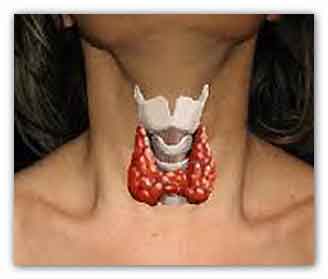|
Environmental factors are determinant for the
appearance of autoimmune thyroid diseases (AITD) in
susceptible subjects.
Environmental factors influence the occurrence of
AITD of approximately 20%, as they are associated
with the activation of innate immune response and
AITD development in susceptible individuals.

Increased iodine intake, selenium, and vitamin D
deficiency, exposure to radiation, from nuclear
fallout or due to medical radiation, are
environmental factors increasing AITD.
Cigarette smoking is associated with Gravesí disease
and Gravesí ophthalmopathy, while it decreases the
risk of hypothyroidism and thyroid autoimmunity.
Viral infections are important environmental factors
in the pathogenesis of AITD, too, particularly human
parvovirus B19 (EVB19) and hepatitis C virus.
Among the many chemical contaminants, halogenated
organochlorines and pesticides variably disrupt
thyroid function.
Polychlorinated biphenyls and their metabolites and
polybrominated diethyl ethers bind to thyroid
transport proteins, such as transthyretin, displace
thyroxine, and disrupt thyroid function.
Among drugs, interferon-and iodine-containing drugs
have been associated with AITD.
Moreover intestinal dysbiosis causes autoimmune
thyroiditis.
Autoimmune thyroid diseases commonly affect more
frequently females than males, such as in many other
autoimmune diseases.
This is probably due to differences between male and
female immune systems, which are present in many
animal species: males have immune suppression versus
females, which is linked to male sexual activity.
Females show greater immune reactivity, and this
increased immunocompetence might translate to
greater resilience to infectious and non-infectious
disorders.
To reduce the risk to populations and also in each
patient, it is necessary to comprehend the
association between environmental agents and thyroid
dysfunction.
For more information
Environmental Issues in Thyroid Diseases
Link...
MDN |